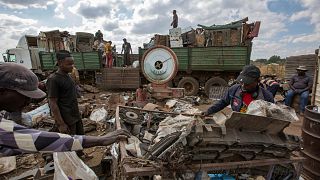Zimbabwe
The last time a white Zimbabwean farmer Rob Smart left his land it was at gunpoint, forced out in June by riot police armed with tear gas and AK-47 assault rifles.
Smart returned on Thursday to ululations and tears of joy from former workers and their families who were also kicked out, a jubilant return and the first sign that the president who has replaced Robert Mugabe is making good on a vow to stop illegal land seizures and restore property rights.
Scores of jubilant black Zimbabweans nearly knocked the 71-year-old off his feet as he and his two children stepped out of their car and onto their land for the first time in six months.
“We are overjoyed, over the moon. We thought we would never see this day coming,“Smart’s son Darry Smart said.
Smart’s case was taken up by Emmerson Mnangagwa, Zimbabwe’s then vice-president who heard of Smart’s violent eviction while at an investment conference in Johannesburg.
Mnangagwa became president last month following a de facto coup that ended 93-year-old Mugabe’s rule. In the latter half of his 37 years in power, Zimbabwe’s economy collapsed, especially after the seizure of thousands of white-owned commercial farms under the banner of post-colonial land reform.
“Getting back to the farm has given not just us but the whole community hope that it’s a new Zimbabwe, a new country.”
Scores of jubilant black Zimbabweans nearly knocked the 71-year-old off his feet as he and his two children stepped out of their car and onto their land for the first time in six months.
White farmers complained that well connected people used state security forces to force them off their farms, sometimes in the middle of harvesting, even after the Mugabe government indicated, some four years ago, that land seizures were over.
“Getting back to the farm has given not just us but the whole community hope that it’s a new Zimbabwe, a new country.”
Smart, whose father started the farm from “virgin bush” in 1932, expressed confidence in the new government’s pledge to protect the commercial farming sector, a mainstay of the struggling economy.
“It’s early days but so far what they (the new government) said they are going to do they are doing,” he told Reuters.
Land ownership is one of Zimbabwe’s most sensitive political topics. Colonialists seized some of the best agricultural land and much of it remained in the hands of white farmers after independence in 1980 leaving many blacks effectively landless.













01:04
South Africa reports new bird flu outbreak on poultry farms
Go to video
Zimbabwe court rejects opposition bid to block Gukurahundi massacre hearings
02:19
South African actor Embeth Davidtz makes directorial debut with Rhodesia-set drama
Go to video
To avoid conflicts with locals, Zimbabwe tracks elephants with GPS
Go to video
Record volume and revenue for Ethiopian coffee exports
Go to video
Putin hosts talks with African leaders on security